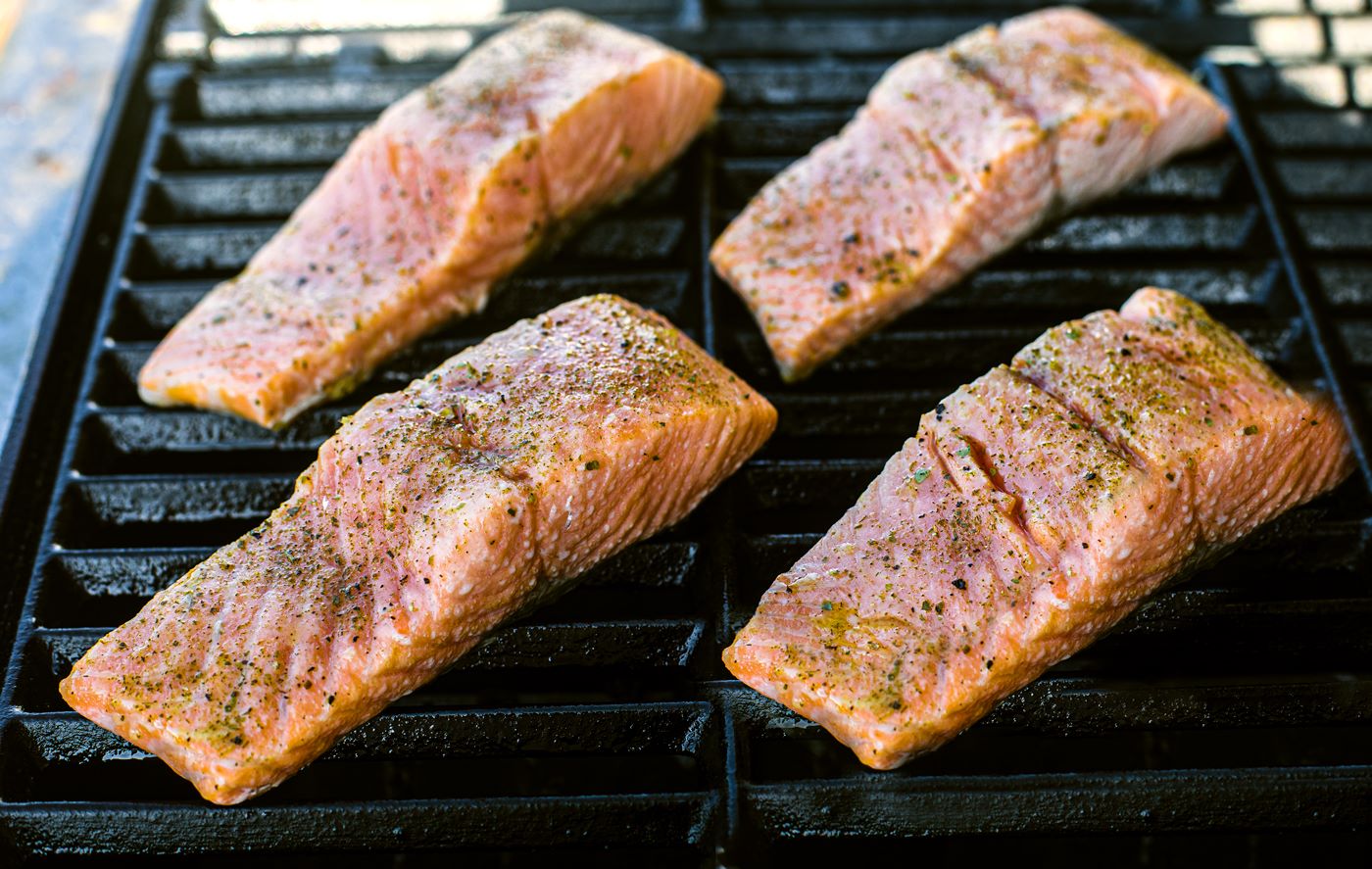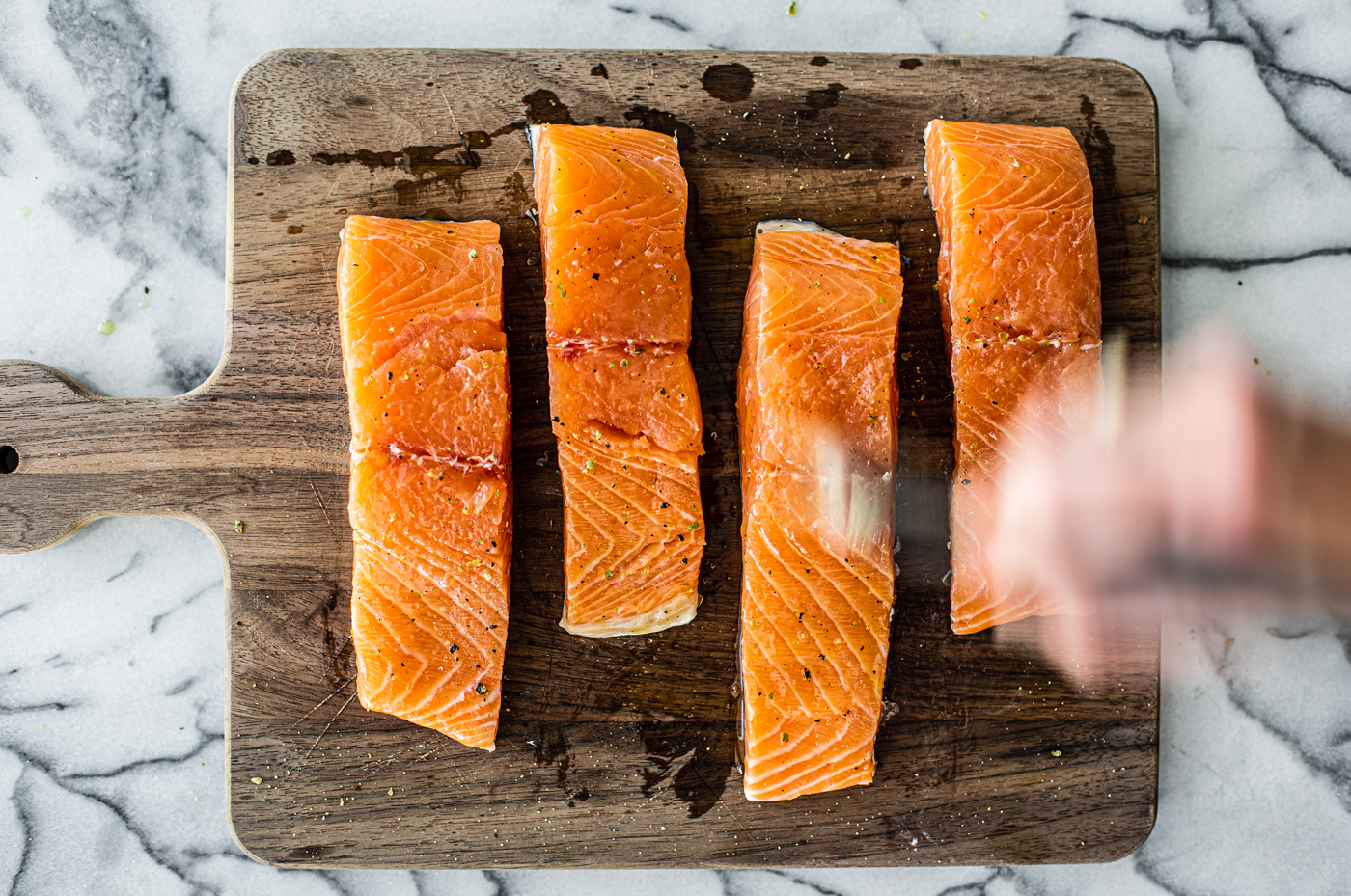Grilled fish is delicious, but if you’re not familiar with the process, it can be a disaster. Learn how to grill fish in this easy tutorial.
Grilling fish can feel intimidating. The main concern most home cooks have is how to prevent delicate fish fillets or whole fish from clinging to the grill grates Nothing’s worse than excitement over beautiful grill marks only to have half the fish left sticking to the grates when you try to flip or remove it!
But there are some simple tricks you can follow to grill fish like a pro and keep it from sticking every time. In this guide, you’ll learn insider tips from grill masters for how to grill any type of fish so it releases cleanly from the grates, ensuring the fish stays intact and cooks perfectly.
Why Fish Sticks to the Grill
Before jumping into solutions, it helps to understand exactly why fish sticks in the first place. There are two main reasons:
1. Surface texture: Fish has an inherently delicate, porous, and flaky texture without an outer protective skin or fat cap. This makes it prone to breaking apart and getting caught on the grill grates.
2 Lack of fat Fish is a lean protein and lacks the fat that keeps other meats from sticking. The little oil fish does have drips away on the hot grill. This leaves the surface to essentially weld itself to the metal rods.
10 Foolproof Ways to Keep Fish From Sticking
Knowing what causes fish to stick equips you to prevent it. Apply these 10 simple tricks for flawless grilled fish that releases cleanly every time:
1. Oil the Fish Generously
Brushing fish all over with oil creates a protective barrier between the delicate flesh and the grill grates. Use a high smoke point neutral oil like grapeseed, avocado, or refined coconut oil. Olive oil can work too but has a lower smoke point.
Make sure to coat the fish thoroughly on both sides as well as the skin, if still attached. Let it sit 5-10 minutes after oiling to allow it to fully soak in before grilling.
2. Oil the Grates Thoroughly
In addition to oiling the fish itself, you need to oil the grates it will be contacting. When the fish hits a well-oiled grate, it’s less likely to weld itself to the metal rods.
Use a grill brush or paper towels held with tongs to coat the entire area the fish will be sitting with a thin layer of oil. Reapply oil to the grates before flipping as well.
3. Use Non-Stick Sprays or Rubs
Specialty non-stick sprays for grilling can also effectively prevent sticking. Spritz liberally over both sides of the fish and the grill grates right before putting the fish on. Let the spray tack up for about a minute first.
Look for spray oils made especially for grilling that contain lecithin or other emulsifiers that increase adherence.
Dry rubs and seasoning blends formulated not to stick are another option. Apply the rub generously onto the flesh before grilling. The coating essentially fries onto the fish sealing it.
4. Grill Skin-On Fillets
Choosing fish fillets with the skin still attached gives you a built-in barrier between the flesh and grill. Lay the fillets skin-side down first and the skin will protect the tender fish as it cooks and chars.
Try salmon, trout, mackerel, or sardines with skin on. Scale the skin first for best results.
5. Use Fish Grilling Baskets and Trays
Specialty grilling baskets provide plenty of ventilation while still protecting more delicate foods from sticking to the grill grates. Load up fillets or whole fish in a basket, close the top, and grill. Just be sure to thoroughly oil the basket first.
Perforated grilling trays or sheets work similarly. You get grill marks on the food while avoiding direct contact with the grates.
6. Grill on a Cedar Plank
Cooking fish directly on a cedar wood plank infuses extra flavor while preventing sticking. The fish essentially steams and smokes surrounded by the wood. Just be sure to soak the plank in water for at least 1 hour before grilling to prevent burning.
7. Preheat the Clean Grill Well
It seems basic but thoroughly preheating a clean grill is one of the best things you can do to prevent food from sticking. Heat allows foods to properly sear and release rather than glue themselves to the grates.
Brush or scrape your grill grates clean before each use. Oil them well and get them piping hot before the fish goes on.
8. Don’t Move the Fish Too Soon
Have patience and allow food to cook undisturbed when it first hits the grill before attempting to flip or move it. If you try to sneak a peek or shuffle it around too soon, it will likely tear or stick.
Let it sear and cook at least 2-3 minutes per side before attempting to move the fish, depending on thickness. When ready, it should release cleanly on its own with just a gentle nudge.
9. Use Two Spatulas
The safest way to flip fish is with two sturdy metal spatulas or fish turners. Carefully slide one under each end of the fillet or whole fish, then gently flip in unison. This keeps the flesh supported so it doesn’t tear.
For whole fish, you can also use a large rigid fish basket to aid in maneuvering.
10. Allow Carryover Cooking
Never serve fish immediately after grilling. As tempting as that first bite may be, carryover cooking is essential. After removing from the grill, let the fish rest off direct heat for 3-5 minutes.
The residual heat finishes cooking the inside without further drying or overcooking the exterior.
Best Fish for Grilling Success
While the right techniques make all the difference, some types of fish are easier to grill and less prone to sticking than others:
-
Firmer fleshed fish: Salmon, tuna, swordfish, mahi mahi, shark, and trout hold up better than more delicate fish.
-
Smaller sized fish: Whole butterflied or smaller fillets are easier to maneuver than large steaks or fillets.
-
Meatier fish: Fattier options like salmon and tuna tend to stick less. Lean fish like flounder are more prone to sticking without extra care.
-
Non-oily fish: Greasy fish like mackerel often stick from the excess oil. Pat dry before grilling to reduce this tendency.
Grilling Whole Fish to Perfection
Grilling a whole fish is easier than you think with the right techniques:
-
Clean the fish scales, gills, and inside the cavity well. Rinse and pat dry.
-
Make diagonal slices along the skin every 2 inches to prevent curling.
-
Liberally oil and season the fish inside and out. Stuff with herbs and citrus if desired.
-
Place on well-oiled hot grates and cook 4-6 minutes per side depending on size.
-
For larger fish, move indirect to finish cooking through without burning. Target 145°F internal temperature.
-
Allow to rest before digging into the gorgeously charred whole grilled fish!
Handling Fish Fillets on the Grill
You can grill firmer fish fillets using direct heat and these tips:
-
Cut into portions no thicker than 1 inch. thinner than 1/2 inch will require a grilling basket.
-
Dry fillets very well and brush with oil or non-stick spray. Season as desired.
-
Place on hot well-oiled grates skin-side down if applicable. Grill 4-5 minutes until releaseable.
-
Gently flip only once during cooking if desired.
-
Cook to 145°F internal temperature or until opaque and flaky.
-
Rest before serving.
Quick Grilled Fish Recipes
Now that you know the foolproof tricks for grilling fish without sticking, it’s time to get cooking! Try out these amazing recipes perfect for summer:
- Baja Fish Tacos
- Cajun Blackened Fish
- Lemon-Herb Grilled Salmon
- Grilled Whole Snapper
- Cedar Plank Salmon
Grilled fish is truly one of the healthiest, easiest dinners you can make all summer long. Just remember these fool

The Best Oil to Use for Grilling
First and foremost, you want to choose an oil with a high smoke point. Most fish is grilled between 400 and 450o F, so you need an oil that can handle that heat. Otherwise you’re dealing with burnt oil that can become chemically altered. Here are some good choices for high heat cooking:
It’s important to note that though these oils are choice oils for high heat cooking, refined oils and seed oils aren’t great for overall health. They’re higher in inflammatory fats and are linked to chronic disease—so moderation is key!
How Long to Grill Fish
Grilling time will depend on the thickness of the fillet, of course. As a general rule, I like to give fish about 8 to 10 minutes on the grill, flipping it over halfway through. So if you have a fillet that is an inch thick, grill each side for 4-5 minutes.
If you try to flip your fish over and it won’t come off the grill, don’t push it. This means it isn’t cooked and ready to be flipped yet, and forcing it will tear the fish. Simply wait another 30 seconds and attempt the flip again until your fish releases itself.

